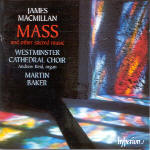James MacMillan is a man of conviction, and his most constantly felt musical message is his Catholicism. The liner-note writer claims that MacMillan “knows that his background will divide [listeners], and that while some will be drawn closer, others will be pushed away by the religious underpinning of so much of his choral work.” (Well, anyone who’s unhinged by religious elements in choral music doesn’t have much choral listening to do!) While the Scottish composer is best known for instrumental compositions such as the terrific percussion concerto Veni Veni Emmanuel (with all the intended religious implications that such a title carries), here’s a full disc of music that elucidates and amplifies his beliefs–music, as finely crafted and satisfying as it is, that comes across as more of a vehicle for the texts than as a destination in its own right. His values are declaimed in gorgeous musical settings–mostly choral, although the Messiaenic organ solo Gaudeamus in loci pace pops up as well.
The centerpiece here is the Mass, commissioned “for the Glory of God in the Millennium Year of Jubilee”, that recalls shades of Britten and was written for this choir. It’s unarguably a modern work, full of unresolved dissonances, but MacMillan’s interest lies in forging another generational link in the chain of Western religious choral tradition that stretches back over centuries.
As a group, the Westminster Choir is splendid and precise, but some of the individual performances are better than others. While boy chorister David de Winter’s ethereal voice floats over the end of Christus vincit, the countertenors of Seinte Mari moder milde get a little hooty. (In the age of supremely accomplished countertenors such as David Daniels, haven’t we gotten past all that?) But those few uneasy moments are washed away in an otherwise glorious turnout. The sound is quite rich, as befits this cathedral’s space, and the balance between organ and choir is even. If you don’t know MacMillan, this would make for a very fine introduction.
































